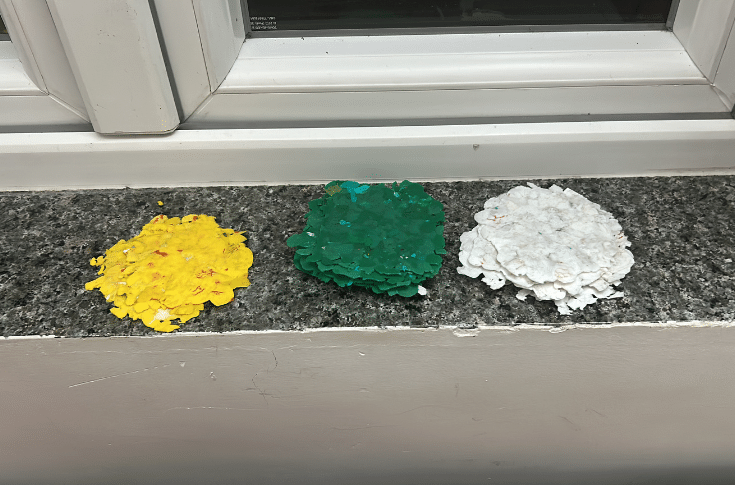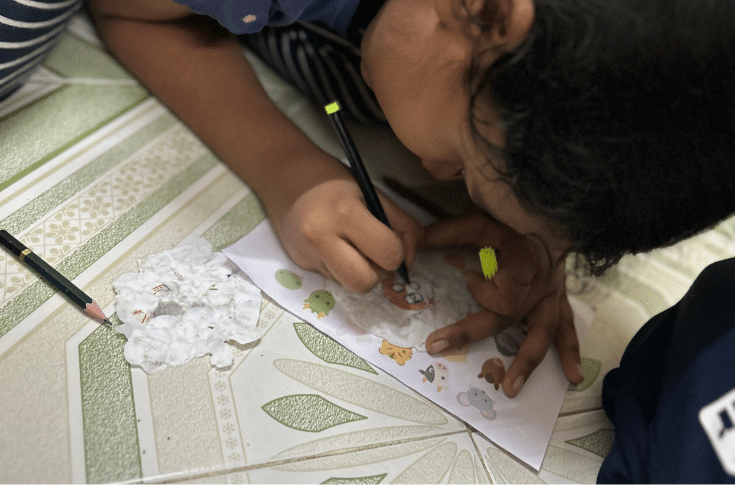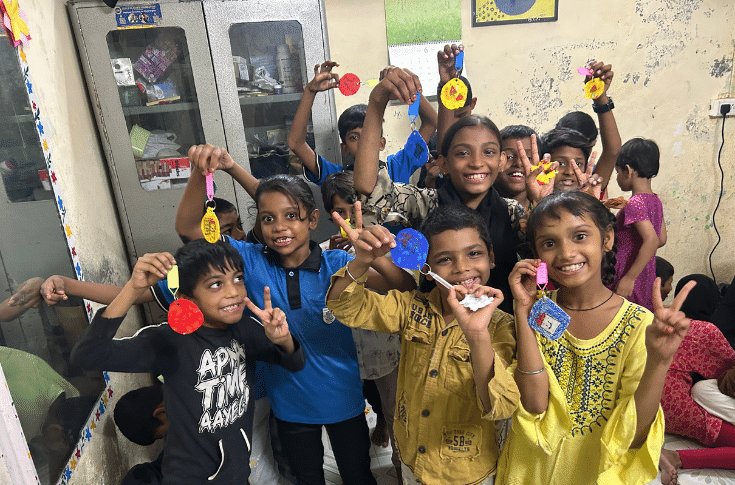Gully Classes Foundation recycles used plastic bottle caps into keychains
On 21 June 2025, Gully Classes Foundation (GCF) organised an initiative of creating keychains from used plastic bottle caps. Jiya Somaiya of WhatPackaging? spoke to Abdul Munaf, founder and director, and Gurudatt Rao, advisor at Gully Classes Foundation.
16 Jul 2025 | By Jiya Somaiya
So, what does GCF do? In real terms, they teach children the habit of collecting 10 plastic bottles over a month to reinforce the learning that waste can be recycled. In addition to the bottle caps required for crafting products, the others would be exchanged with Buy Food With Plastic, GCF’s NGO partner, for meals, offering a reward for the activity. Gurudatt Rao says, “This may seem like a small step, but this serves the environment by cutting the amount of plastic ending up in landfills and water bodies.”
Rao continues, “GCF in the past has experience working with underprivileged women to fulfil corporate gifting exercises during Diwali. We continued to explore this, and began exploring more ideas where women could create sustainable products that are meant for uptake by climate-conscious consumers.”
A non-profit organisation, located in Ghatkopar in Mumbai, GCF provides underprivileged children access to elementary education. The foundation has enrolled 90 children at the Ghatkopar centre.
Abdul Munaf says, “Our aim is to provide an avenue for children, especially, to indulge in creative expression while learning about sustainability and responsible consumption.”
Not all trash is worthless
WhatPackaging? spoke to Munaf and Rao about 21 June. This was the day the foundation, in collaboration with Shumei India and Buy Food with Plastic, created keychains from used plastic bottle caps, intending to educate children that not all trash is worthless and waste products can be made useful.

Munaf and Rao spoke of the inspiration behind the initiative and how the activity aligns with the foundation’s broader goals. Munaf answers, “Plastic is at the centre of visible waste that ends up in landfills, water bodies and even hill tracts.” He adds, “We felt that we needed to indulge in making an upcycled product that lives beyond the utility that the bottle was originally envisaged for and give it a new lease of life.”
This idea led the foundation to begin creating keychains out of used plastic bottle caps. Rao mentioned ideas to expand the initiative, the foundation’s focus on sustainability, and Buy Food with Plastic’s role as the foundation’s NGO partner: “To implement the mandate (meals in return for collected bottles), established with our NGO Partner, Buy Food with Plastic, we plan to expand this idea beyond bottle caps to additional plastic goods.”
The foundation has been working with Shumei India, a Japanese organisation, to organise creative and educational initiatives for underprivileged children. “We developed some handmade art products created by women from our community, and handed them over to Shumei India in January 2025. These products were well-received when sold in mainland Japan between March and May 2025,” Rao says.
The process of transforming used plastic bottle caps into key chains
Munaf and Rao shared the steps involved in transforming the bottle caps into keychain plates. Munaf says, “Before we delved into the steps linked to doing the transformation, the focus was to garner the raw material – bottle caps. For this, we received support from our partner organisation, Buy Food With Plastic. They helped us with sourcing the caps in sufficient quantities for us to indulge in trial and error to fine-tune our final product.”

The procedure was divided into multiple steps, including sourcing, cleaning the caps to remove any residues, shredding the caps into pieces, heat treatment to shape the bottle caps, and lastly imprinting art to create a unique end product. Rao says, “We got support from our volunteers and partners to arrive at the final finished product.”
Waste management and recycling
Munaf spoke about tiny-tangible actions which can contribute to a larger movement of plastic waste reduction and recycling, especially among the youth. He says, “We believe that when children actively participate in such hands-on activities, they begin to understand the impact of their choices and actions. It’s not just about making a keychain—it is about developing a mindset that values reuse, sustainability, and responsibility.” He continues, “As tomorrow’s citizens, small steps can lead to a mindset modification that can take us towards a stronger culture of sustainability.”
We asked Munaf and Rao about a new regulation that they would like to see that would hold plastic producers responsible for the waste they generate. Rao says, “We believe the rules at present suffice, and the focus should be more on enforcement and pushing the idea that waste management is not a burden but an action for the collective good through Extended Producer Responsibility (EPR).” He adds that waste management has the possibility of creating thousands of jobs and creating a new industry vertical focused on material recovery.

Munaf highlights the importance of 3R: Reduce, Reuse, Recycle to 6R: Refuse, Reduce, Reuse, Repair, Recycle, Rethink. He says, “We believe that the focus should move towards responsible consumption, like avoiding the use of use-and-throw pens, taking a personal cup to the cafeteria, and bringing silverware from home rather than using single-use cutlery.”
Rao concurs. He says, every citizen should be taught that plastic usage should be driven by necessity rather than want. In conjunction with population control and AIDS awareness programs, campaigns must be conducted to minimise the use of single-use plastics and utilise other plastics responsibly.
Community actions and support
When asked if there are ways the industry (and the readers of WhatPackaging? magazine) can get involved or support GCF’s efforts, Munaf says, “Without the involvement of people, not even democracy functions. Accordingly, the fight against climate change and sustainable living cannot be adopted or implemented till people genuinely believe in the cause and adopt it in their daily lives.”
Rao adds, “GCF has been doing beach and public space cleanups for many years now and has been a vocal advocate to push citizens to be conscious about their littering and consumption patterns.”
Munaf mentioned that the foundation broadcasts via offline and online mediums before organising cleanup drives in public spaces, and that they have observed an increase in the involvement of community members and volunteers over time. He says, “Despite this, we hope that littering can be controlled, and we can focus on the upcycle and recycling areas, which can create sustainable livelihoods for the underprivileged.”
Both Rao and Munaf sign off with a quote by John Dewey, “Education is not preparation for life - education is life itself.”
Gully Classes Foundation was founded during the Coronavirus illness epidemic to make an impact on education, the environment, and skill development.
The foundation was founded to address the problem of high dropout rates among children of daily labourers. Depending on job opportunities, the parents would relocate inside or outside of the city; this resulted in children dropping out of school.
Munaf, concerned about the attrition, aimed to reduce dropout rates and attempt to re-enrol students who had dropped out. This idea led him and a few volunteers to begin teaching remedial lessons to children in small slum communities in Mumbai. These were junctions that led to alleyways (called gullies in Hindi). The initiative was named Gully Classes based on its implementation style and ease of recall.


